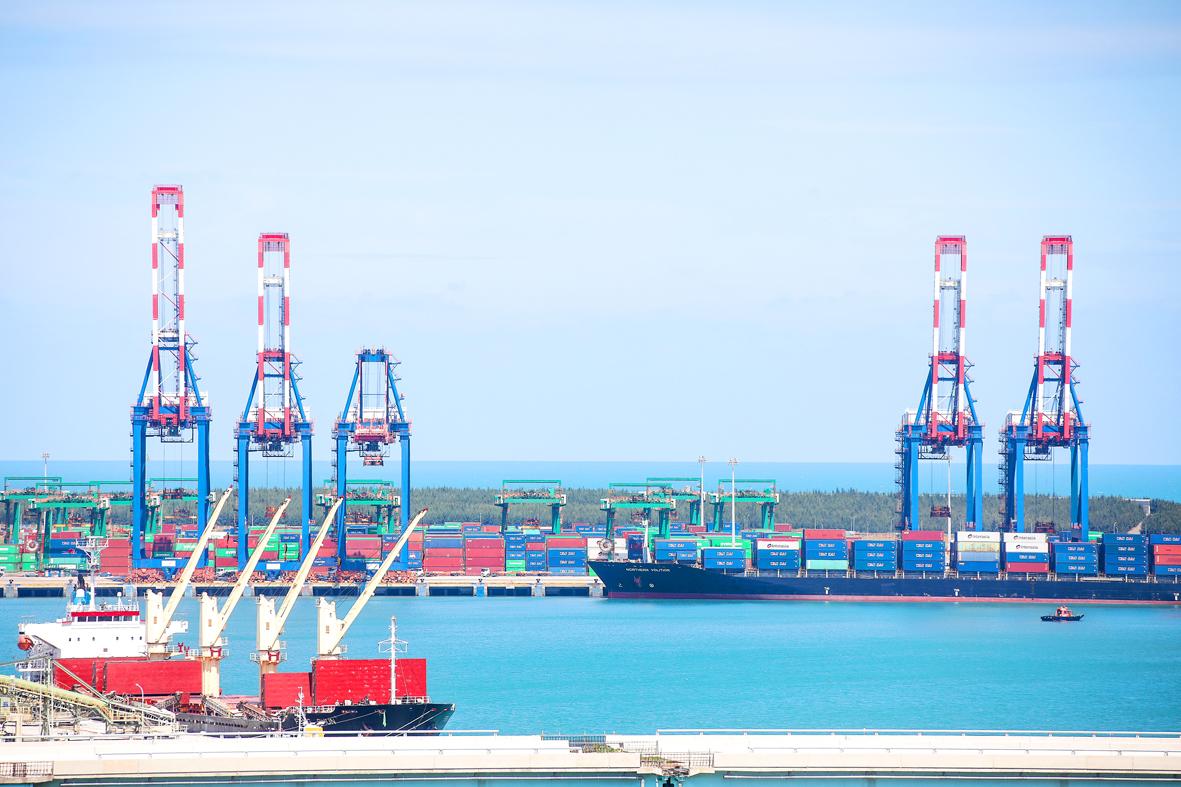Negotiations for a bilateral trade agreement between Taiwan and the US are still likely to go forward despite a change in the US presidency, Deputy Minister of Economic Affairs Chen Chern-chyi (陳正祺) said yesterday.
The Trade and Investment Framework Agreement (TIFA) under which Taiwan and the US hold formal talks has a high chance of resuming and is an important catalyst for a bilateral trade agreement, Chen said.
Chen pointed to Taiwan’s recent announcement that it would ease restrictions on imports of US pork containing the leanness-enhancing drug ractopamine.

Photo: Cheng I-hwa, Bloomberg
Washington has long criticized Taiwan’s zero-tolerance policy for ractopamine as an impediment to trade, and as a result of this, it has not held formal talks with Taiwan through the TIFA framework since October 2016.
However, many believe it would be an opportune moment to take tangible steps toward completing a US-Taiwan trade pact, because the Taiwanese government in August announced that it would ease restrictions on imports of US pork products containing the drug.
The easing of the restrictions removes a trade obstacle, with US officials from various parties showing support for a deal, Chen said.
More people in the US are calling for US companies to invest in Taiwan as relations between the two countries have improved over the past few years, Chen said.
“This shows that the direction of a bilateral trade agreement will not change, just like an aircraft carrier cannot change the direction of its course quickly,” Chen said.
However, it might take some time for a trade pact to be signed because US president-elect Joe Biden would first need to work on how to deploy his administration personnel, Chen said, adding that the chances of a bilateral trade agreement being signed look good and are increasing.
The biggest difference between Biden and US President Donald Trump is that Biden would likely look for like-minded allies, he said.
Taiwan’s chances of joining the Comprehensive and Progressive Agreement for Trans-Pacific Partnership (CPTPP) would rise if the US joins and leads the trade agreement, Chen said.
The Japan-led CPTPP, which grew out of the Trans-Pacific Partnership after the US left the pact in January 2017, represents a market of 500 million people and accounts for 13.5 percent of global trade.
US Undersecretary of State for Economic Growth, Energy and the Environment Keith Krach also concluded a visit to Taiwan in September and discussed improving economic ties, amidst hopes that official trade talks could be held before the end of the year, Chen said.
Krach was the highest-ranking US Department of State official to visit Taiwan in more than four decades.
Even though Trump lost his re-election bid, it is unlikely that US policies, including those on China, would change dramatically overnight, Chen said.
The Ministry of Economic Affairs remains “cautiously optimistic,” he added.
Chen said that the trade dispute between the US and China would continue, as the two still disagree on many issues, including Beijing’s passage of national security legislation for Hong Kong, and the violation of Uighurs’ human rights in China’s Xinjiang region.

In Italy’s storied gold-making hubs, jewelers are reworking their designs to trim gold content as they race to blunt the effect of record prices and appeal to shoppers watching their budgets. Gold prices hit a record high on Thursday, surging near US$5,600 an ounce, more than double a year ago as geopolitical concerns and jitters over trade pushed investors toward the safe-haven asset. The rally is putting undue pressure on small artisans as they face mounting demands from customers, including international brands, to produce cheaper items, from signature pieces to wedding rings, according to interviews with four independent jewelers in Italy’s main

Japanese Prime Minister Sanae Takaichi has talked up the benefits of a weaker yen in a campaign speech, adopting a tone at odds with her finance ministry, which has refused to rule out any options to counter excessive foreign exchange volatility. Takaichi later softened her stance, saying she did not have a preference for the yen’s direction. “People say the weak yen is bad right now, but for export industries, it’s a major opportunity,” Takaichi said on Saturday at a rally for Liberal Democratic Party candidate Daishiro Yamagiwa in Kanagawa Prefecture ahead of a snap election on Sunday. “Whether it’s selling food or

CONCERNS: Tech companies investing in AI businesses that purchase their products have raised questions among investors that they are artificially propping up demand Nvidia Corp chief executive officer Jensen Huang (黃仁勳) on Saturday said that the company would be participating in OpenAI’s latest funding round, describing it as potentially “the largest investment we’ve ever made.” “We will invest a great deal of money,” Huang told reporters while visiting Taipei. “I believe in OpenAI. The work that they do is incredible. They’re one of the most consequential companies of our time.” Huang did not say exactly how much Nvidia might contribute, but described the investment as “huge.” “Let Sam announce how much he’s going to raise — it’s for him to decide,” Huang said, referring to OpenAI

The global server market is expected to grow 12.8 percent annually this year, with artificial intelligence (AI) servers projected to account for 16.5 percent, driven by continued investment in AI infrastructure by major cloud service providers (CSPs), market researcher TrendForce Corp (集邦科技) said yesterday. Global AI server shipments this year are expected to increase 28 percent year-on-year to more than 2.7 million units, driven by sustained demand from CSPs and government sovereign cloud projects, TrendForce analyst Frank Kung (龔明德) told the Taipei Times. Demand for GPU-based AI servers, including Nvidia Corp’s GB and Vera Rubin rack systems, is expected to remain high,